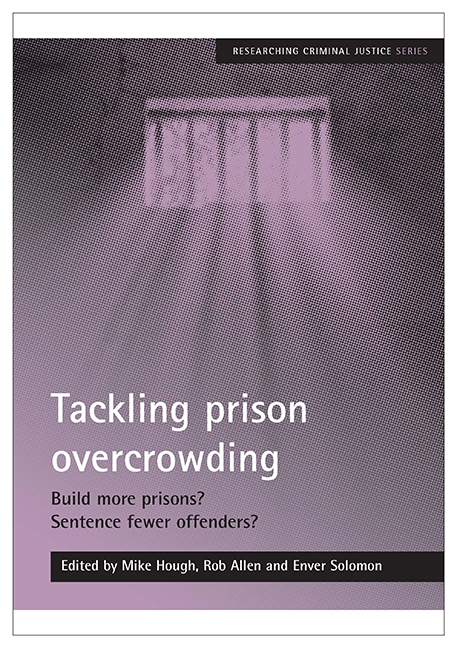Book contents
- Frontmatter
- Contents
- List of figures and tables
- Acknowledgements
- Foreword
- Notes on contributors
- 1 Introduction
- 2 The prisoners’ dilemma in England and Wales
- 3 Building on sand: why expanding the prison estate is not the way to ‘secure the future’
- 4 Towards more consistent and predictable sentencing in England and Wales
- 5 ‘Titan’ prisons: do size, efficiency and legitimacy matter?
- 6 Private punishment? An examination of the expansion, development and employment relations of private prisons
- 7 Reducing the use of custody as a sanction: a review of recent international experiences
- 8 Where now?
- 9 Endnote: latest developments in penal policy
8 - Where now?
Published online by Cambridge University Press: 25 March 2023
- Frontmatter
- Contents
- List of figures and tables
- Acknowledgements
- Foreword
- Notes on contributors
- 1 Introduction
- 2 The prisoners’ dilemma in England and Wales
- 3 Building on sand: why expanding the prison estate is not the way to ‘secure the future’
- 4 Towards more consistent and predictable sentencing in England and Wales
- 5 ‘Titan’ prisons: do size, efficiency and legitimacy matter?
- 6 Private punishment? An examination of the expansion, development and employment relations of private prisons
- 7 Reducing the use of custody as a sanction: a review of recent international experiences
- 8 Where now?
- 9 Endnote: latest developments in penal policy
Summary
Introduction and Setting
The seminar at King's which resulted in this volume was organised to stimulate thinking about the propositions put forward in Lord Carter's review, Securing the future (Carter, 2007). Consideration focused on two key recommendations:
• that a more structured sentencing framework be developed by establishing a permanent sentencing commission; that this proposition early be explored by a working group to consider its advantages, disadvantages and operational feasibility; with the working group reporting to the Lord Chancellor and Lord Chief Justice by summer 2008 (Carter, 2007, p 35);
• in order that the Government be able to cope with current prisons undercapacity that a range of measures be taken urgently to increase prison capacity and reduce the demands made on it; in addition to existing plans, there should be built three very large, multi-functional prisons, ineptly named Titans, each providing 2500 additional prison places. (Carter, 2007, p 38)
These two proposals had by early May 2008 gained considerable momentum. In relation to the first, the Lord Chancellor and Lord Chief Justice almost immediately, in January 2008, established a Working Group under the chairmanship of Lord Justice Gage. In late April the Gage Working Group, several of whose members participated in the seminar, published a consultation paper (Sentencing Commission Working Group, 2008) setting out a number of questions on which the Group sought opinion by 2 June 2008 with a view, as Carter recommended, that the Group reach conclusions and report to the Lord Chancellor and Lord Chief Justice by summer 2008. This, we must assume, meant reporting within a few weeks of the Group's deadline for submissions. Meanwhile Ministry of Justice ministers announced that Titan prisons, or multi-functional prison clusters as they preferred to call them, were now part of the government's prison-building programme. Although the Lord Chancellor promised a consultation early in 2008 and subsequently in April, the consultation paper did not appear until 5 June. By the time the seminar took place, however, advertisements had appeared in the press for both suitable brownfield sites in the South East, the Midlands and the North West and the appointment of a senior manager to head up their selection and development.
The seminar was thus not merely timely, but during the course of the day it took on an air of urgency. Events were moving apace.
- Type
- Chapter
- Information
- Tackling Prison OvercrowdingBuild More Prisons? Sentence Fewer Offenders?, pp. 123 - 132Publisher: Bristol University PressPrint publication year: 2008



